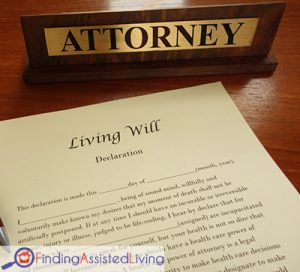 A healthcare surrogate, sometimes called an “agent”, is a person appointed by you to make medical decisions on your behalf if you are not able to make or communicate them yourself. The healthcare surrogate is one form of an advance health care directive, a statement of your wishes in case you are not able to express them. Advance healthcare directives, including the healthcare surrogate, are governed by state laws so it may be wise to consult a local attorney if you have any questions.
A healthcare surrogate, sometimes called an “agent”, is a person appointed by you to make medical decisions on your behalf if you are not able to make or communicate them yourself. The healthcare surrogate is one form of an advance health care directive, a statement of your wishes in case you are not able to express them. Advance healthcare directives, including the healthcare surrogate, are governed by state laws so it may be wise to consult a local attorney if you have any questions.
The law recognizes the right of every competent adult to make his or her own decisions about healthcare matters; this includes the right to refuse medical treatment when it is no longer wanted. As long as a person is alive, competent and able to communicate their wishes, they have the sole power to continue or stop medical treatment. Unfortunately, there are cases in which the ill or injured person is not able to make decisions or to express their choice about medical treatment.
The “healthcare surrogate” is an actual person that you choose to speak for you when you cannot. Another form of advance directive is the “living will.” The living will is a document, not a person, that gives direction to treating physicians in case you are not able to do so. The living will puts down in writing what types of treatment and under what conditions you would want them if you are not able to communicate.
The healthcare surrogate is an actual person, but there is also a legal document called a “healthcare surrogate designation.” This document names in writing a person whom you trust to make medical decisions for you if you are unable to do so. It also allows you to name an alternate surrogate if the first designee is not available for any reason. Choosing a person to act as your healthcare surrogate is an important decision and should be carefully considered. This person should be an adult and preferably one who lives nearby in case they are needed in an emergency. It should be someone you trust to carry out your wishes and you should discuss this matter with them in advance.
 Making a living will and choosing a healthcare surrogate are wise and kind things to do. This preparation may very well avoid conflict at a very stressful time and save your family and loved ones much anguish. If you are appointing one of your family members to be your healthcare surrogate, it is wise to inform all other members of your family of your choice. In many cases, there is agreement among family members about how to handle end-of-life issues, but conflict can arise over when life-extending therapy should cease. If you have made your wishes clear in advance, the burden of this decision is lifted.
Making a living will and choosing a healthcare surrogate are wise and kind things to do. This preparation may very well avoid conflict at a very stressful time and save your family and loved ones much anguish. If you are appointing one of your family members to be your healthcare surrogate, it is wise to inform all other members of your family of your choice. In many cases, there is agreement among family members about how to handle end-of-life issues, but conflict can arise over when life-extending therapy should cease. If you have made your wishes clear in advance, the burden of this decision is lifted.
If you do not have an advance healthcare directive (a living will, a designated healthcare surrogate or some combination) and you should become injured or so ill that you cannot speak for yourself, a court may step in and appoint a family member or another person as your surrogate. The laws governing this decision are written in each state. This situation can result in unnecessary stress, anguish and even in conflict among family members if you have not acted. Every adult, even younger ones should make some form of advance healthcare directive.
The webpage of your state’s Bar Association can provide you with the standard forms used in the state of your residence. If you need to consult an attorney, this is usually a simple and inexpensive legal matter. If you make either a living will or a healthcare surrogate designation and change your mind for any reason, this choice can be revoked by simply making a new surrogate designation or changing your living will. It is important to know that appointing a person as your healthcare surrogate does not give them power of attorney over your non-medical affairs. It gives them only the right to voice your wishes concerning medical treatment.
There is really no reason to not make some form of advance directive. If you have not done so already, do it now!
Making some form of advance healthcare directive is one of the many things that any person transitioning to a senior lifestyle should do. There are many others, too numerous to list in a short article. Finding Assisted Living and FindingAssistedLiving.com exist to help seniors or their loved ones to make a happy and successful transition to senior living. This may involve expertise in medical, legal, real estate, financial and estate planning tax advice and other areas. FAL can provide dependable, knowledgeable, unbiased advice on legal matters, providers of home health services, and other services related to senior life and the maintenance of independent living. Please call on us for advice you can trust.
Thank you for visiting the web site of FindingAssistedLiving.com The information contained on this website is provided for educational and informational purposes only. The contents of this site are not and should not be construed as legal advice. The website is not an offer to perform services on any matter. This website contains general information from a variety of sources and might not reflect current legal developments, verdicts or settlements. Please consult a professional such as an attorney and or CPA when taking these matters into consideration for you or loved one.
